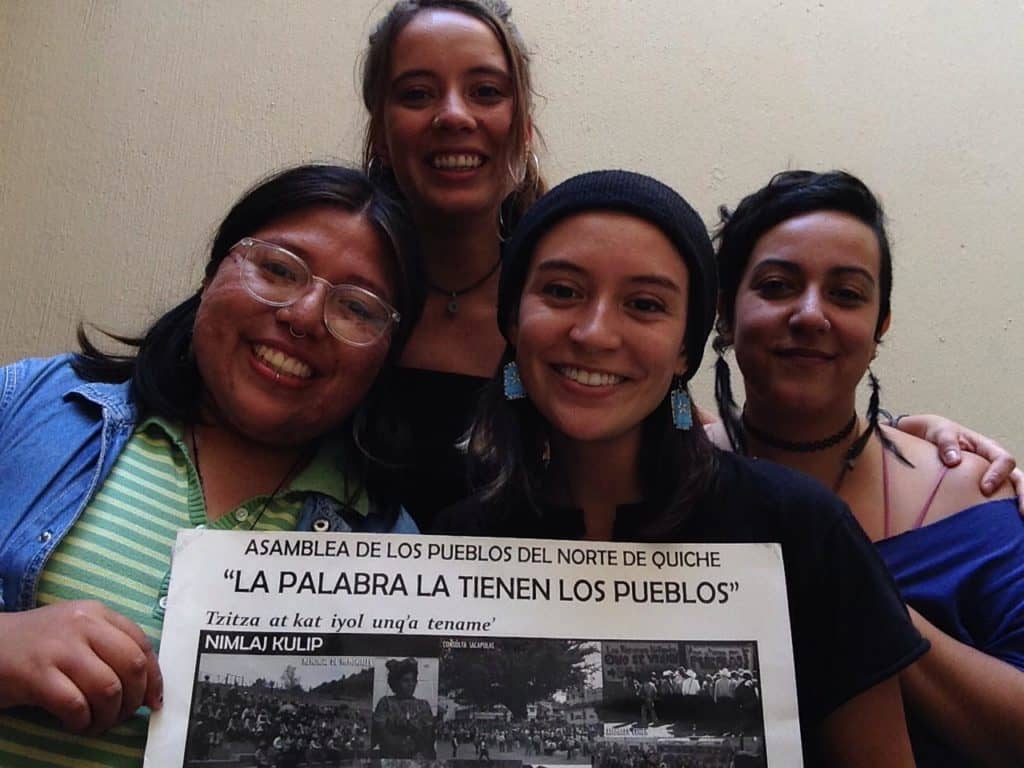GAP Internacionalista seeks to dissuade violence against our Guatemalan partners and connect them to movements in the U.S. for Indigenous sovereignty and immigration justice. All GAP Internacionalista work is done at the request of our partners and according to their strategic vision. GAP Internacionalista uses a diversity of tactics, including human rights observation and documentation, physical presence, grassroots education, campaigns, and advocacy with decision makers. Volunteer accompaniers serve for periods of six months to a year, and then return to organize their home communities in solidarity with our Guatemalan partners.

Isa, Chris, Nico y Michelle, former Internacionalistas at NISGUA’s office in Guatemala.
“The work of NISGUA is highly important to the Xinka People. Through NISGUA we are able to visibilize our work and struggle. This is important because when the authorities see that we have international accompaniment, we feel strong, we feel good, because we know that the authorities are afraid of international inspection”.
“Being an accompanier with NISGUA was an extremely important piece in my political formation and radicalization. Learning from and collaborating with our Guatemalan partners, forming mutual relationships, and incorporating lessons from their luchas has been such a beautiful honor. The work is deeply valued by our partners and must continue until it is no longer necessary”.
“I was already an organizer when I joined NISGUA. I had already spent years of my life working towards realizing visions of a world that is capable of embracing all in its wholeness. And even given that, my experience as an Aco with NISGUA transformed my perspective. It helped me to embody a sense of “nosotres”, a collective sense at the cellular level, that I had never achieved in the US. Sure, there are parts of being an Aco that are shocking, but I found that the transformation happened in the most mundane, everyday parts. To be an Aco is to have your expectations shattered, to really question the use of solidarity, to learn to build a purpose that links you to a collective understanding of life”.
“Internationalism is recognizing how interconnected we all are, collaborating in cross-border struggles for justice, and working together to dismantle systems of oppression. It was a great honor for me to accompany struggles for land, territory and justice in Guatemala, struggles that are ultimately interwoven and closely connected with those in the United States. My time as an accompanier taught me invaluable lessons on humility, privilege, creativity, anti-racism, resilience, trauma, relationship-building, and accountability and left me with the desire to continue doing my part for the long haul”.
“For me, international accompaniment is essential to establish relationships and solidarity between global movements. Accompanying in Guatemala from the U.S. is a way to combat the imperialism that created and is creating environmental, economic and political crises in the global south, and the best way to meet amazing Guatemalans and support their resistance. I am excited to be an ACO in 2024 and invite you to be part of the program with me!”.
“Internationalism is a critical response to the ever-expanding global influence of the dominant classes; as their power transcends borders, so must our resistance. Yet, as internationalist people-power expands over borders, it does not homogenize and it does not accumulate. Rather, it employs the full spectrum of human expression as a means to democratize power structures. It hinges on the transformation of our diversities – and the ways that those diversities intersect with experiences of autonomy and oppression – into collective resistance through globalized solidarity. It signifies the recognition that the collective liberation of working people, spanning both colonized and colonizing nations, can only be achieved through the formation of a unified coalition”
